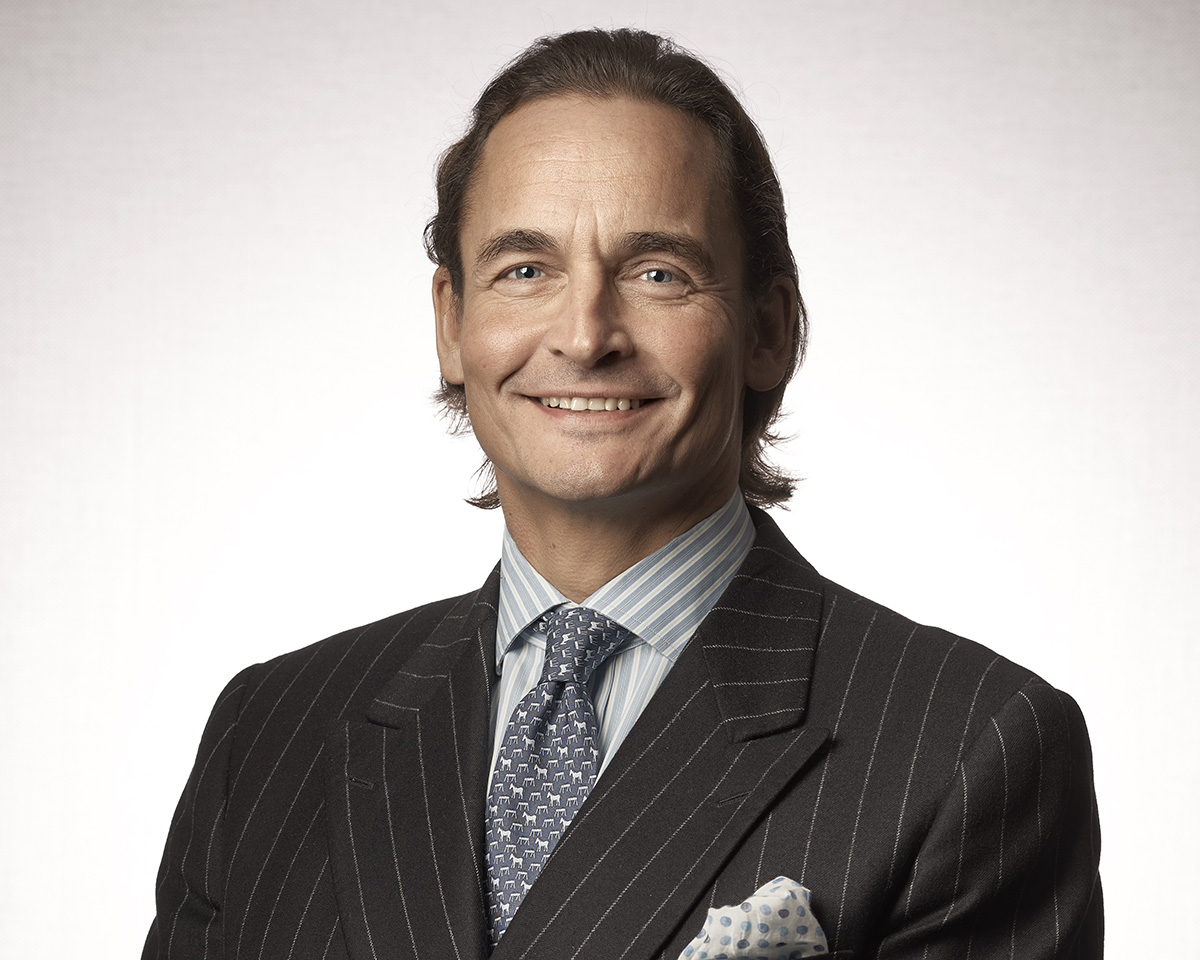
Philanthropist and businessman Etienne d’Arenberg
Etienne d’Arenberg hails from one of Europe’s oldest families and is treasurer of the Arenberg Foundation, whose mission is the promotion of the understanding of European history and culture. He is a partner of family-owned Swiss private bank Mirabaud. He is also President of the Menuhin Competition Trust, and Trustee of several Swiss and UK charities. He speaks to LUX about European values, and the evolving perspectives and expectations of the next generation
LUX: Has the nature of philanthropy changed in the last two decades?
Etienne d’Arenberg: Both from my private banking experience at Mirabaud as well as from various circle of donors I belong to, I feel that there is a clear evolution in philanthropic practices. Firstly, there is an increasing involvement in philanthropic areas outside the traditional non-profit sector with growing interest from both governments and companies to partner with individual donors on specific issues. Secondly, and this is probably the consequence of the first point, there is an increasing focus on systemic change and transformative grant-making approaches that achieve greater leverage. Lastly, and this can become challenging for smaller institutions, there is a growing expectation for impact measurement and focus on KPIs.
Another trend that I see emerging in large donors’ circles – often business-owning families – is the need to align business and family platforms. The time where your company was polluting the rivers while at the same time your family foundation was giving to the WWF is over. There is a search for coherence between the different activities with a growing alignment between the business, the investment vehicle(s) and the philanthropic foundation. Interestingly, private banks in Geneva such as Mirabaud have been at the forefront of this trend with their founding families being very active in local communities, while at the same time promoting a company’s approach to addressing the most pressing social and environmental issues.
Follow LUX on Instagram: luxthemagazine
LUX: Tell us more about your last point – are people being judged by different criteria?
Etienne d’Arenberg: We are faced with issues of huge magnitude, both on the societal and environmental front and this is especially true in times of COVID-19. If you combine this with growing access to information, I do feel that there is a real demand from the public for more sustainable business practices and generally speaking pressure for accountability. I see this pressure mounting, especially from a new generation of customers and employees.
If you run a company that is active in socially or environmentally damaging activities, the issue is that you will not be able to shift your business focus overnight. Our role as investors – and this is what we do at Mirabaud – is to accept companies that may not yet be there, but which are able to demonstrate a forward-looking vision including a clear strategy to transition to clean, circular and inclusive business models. For a family-owned or family-controlled company such as Mirabaud, this is also a wonderful opportunity to reconnect with purpose and long-holding family values.

The Arenberg Foundation organises concerts in the remote village of Lauenen, in central Switzerland.
LUX: Is inclusion and bringing people together an important element of philanthropy?
Etienne d’Arenberg: Inclusion is about embracing people irrespective of their difference, whether that’s race, ethnicity gender, sexual orientation or identification, religion or economic circumstances, and providing them with equal opportunities. This is where philanthropy plays an important role as inclusion often starts with access to education, healthcare or basic needs.
But inclusion is also about getting rid of bias, the “us versus them” old way thinking, and embracing the fact that our difference is something positive: this goes far beyond the tropic of philanthropy. I come from quite a traditional background, but I am proud to say that I do not feel threatened by a society that changes. Quite to the contrary and under the impulsion of my daughters, we have been revisiting family values and behaviours, making sure not to pigeon-hole people and being particularly mindful not to impose suffering by raw reflexes of exclusion.
Mirabaud has also committed itself to diversity and inclusion, making sure, for example, that we create an optimal workplace for women. The fact that we were one of the first Geneva private bank to welcome a female managing partner helped us to develop a solid framework for gender equality practices. This has nothing to do with tokenism as it is based on the strong conviction that a forward-looking institution needs different perspectives and experiences.
Read more: Sophie Neuendorf on building a more sustainable art world
LUX: With the demands that are ever growing on the state sector, does the private sector need to step in more to support the cultural and charitable activities that were previously more supported by the state?
Etienne d’Arenberg: I don’t want to be a judge of the private sector being ‘not enough’, because whatever comes is already something and some individual donors are immensely generous. As I was mentioning before, there is an increasing need for approaches that achieve greater leverage and I believe that public-private partnership will play a greater role in addressing the need for systemic change.
The private sector can also act as a catalyst for change, raising awareness on specific issue and campaigning direct governmental support. I have been following the work of a UK charity which focuses on children food poverty: this is a very good example of an initially privately funded charity, who is actively campaigning for legislative change and working in close collaboration with government on food delivery. I am sure that we will see more on this in the future.

The Bol d’Or Mirabaud regatta on Lake Geneva
LUX: Does the next generation of wealth owners have different priorities for philanthropy?
Etienne d’Arenberg: Traditionally, family businesses or wealth owners have been quite active in their communities, and Mirabaud is no exception, both at the bank and at the partners’ level. Ask many Geneva-based NGOs, charities, cultural or sport institutions and they will tell you about its commitment.
I feel that the type of issues Generation Z cares about are a little bit different and I see this with my daughters. Their preoccupations are centred around inclusion, mental health, environment and racial equity. They will tell you bluntly that they are not prepared to work for a company that does not match their ethics or values, even if that means foregoing a number of lucrative jobs. To my view, this is quite representative of a generation that is much open to a new set of issues.
What is also changing is the active role they are ready to take. I think that the generation of philanthropists who will just sign a check is slowly over, and we will see a new generation of individuals who will want to take a much active role, starting earlier in life as volunteers, advocates or activists, and using a wider range of engagement tools.
As I said, Mirabaud has demonstrated a 200-year-old interest in the communities in which it operates and I sense that as a bank we are particularly interested in understanding this new generation, not only because they are our future clients and employees, but also because they are shaping the future we will be operating in, as a company.
Read more: Lamberto Frescobaldi on 1000 years of tradition and wine
LUX: Do Mirabaud’s philanthropic contributions focus on culture and the arts?
Etienne d’Arenberg: First and foremost, concerning contemporary art, in recent years we’ve been sponsors of FIAC in Paris among various other renowned institutions. We’ve also sponsored the Zurich Art weekend, which is, in a way, the pre-Art Basel event, in a more intimate setting. Even if we are an institution that celebrated its 200th birthday in 2019 (so we are 202 years old now) our motto is always “to be prepared for now”. As in, immediately at your service, to sponsor and to be interested in today’s world and that’s why we are interested in contemporary art. We know the value of looking into the past, and taking lessons into the future.
The second thing to remember is that culture is not something which always pertains to art. If you look at the enthusiasm of the public, art is not always the biggest thing, sports, for example, are part of the culture of a nation. We are sponsors of the largest inland regatta competition in the world, the Bol d’Or Mirabaud on Lake Geneva, and it’s a fascinating competition, because the lake has very particular wind conditions that are ever-changing, it is not a one-sided Caribbean type wind that comes constantly from one side and doesn’t change that often. Here again our motto “prepared for now” completely makes sense.
LUX: The concept of Europe is an important one for your family foundation. Why?
Etienne d’Arenberg: When we think about Europe, our family thinks of the continent which includes Switzerland and the United Kingdom, not only the European Union. The concept of Europe is indeed very important for our family, as it includes a set of value that are dear to our heart: human dignity, rule of law, equality and democracy to name a few. This sounds wonderful and noble, but the truth is that it is quite vague in practice.
What we have been trying to do with our family foundation is to revisit these values in the light of today’s challenges and explore new ways to shape our common future.
I am personally convinced that Europe has a key role to play in shaping the post-COVID recovery, and building a new social contract based on these long-lasting European values and at a very modest level, we are trying to be part of this conversation.
Etienne d’Arenberg is limited partner of family-owned Swiss private bank Mirabaud and is Head Wealth Management United Kingdom.
Find out more: arenbergfoundation.eu, mirabaud.com








